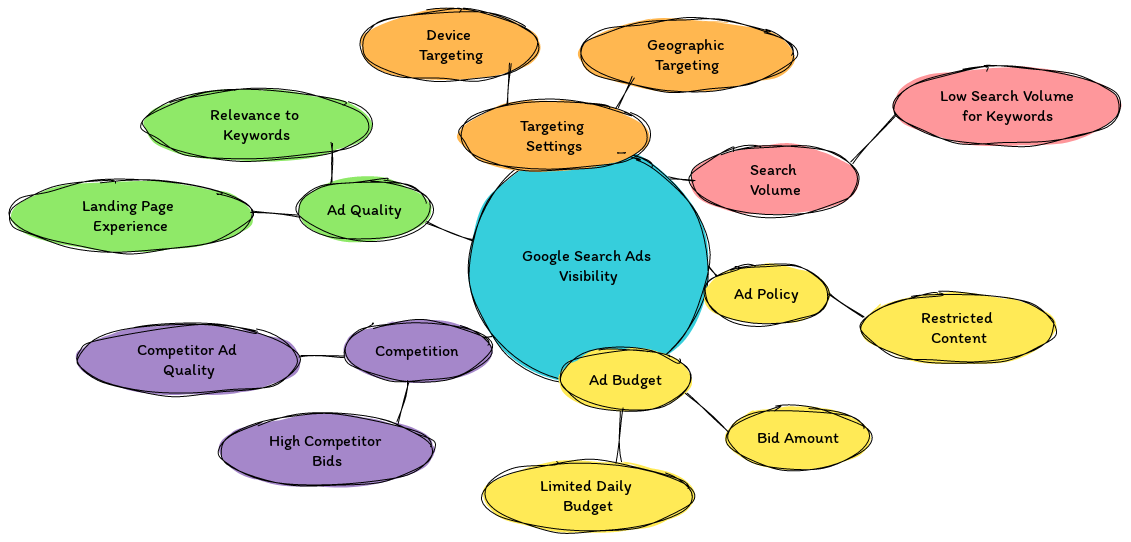Why Your Website Isn't Ranking: The SEO Mistakes to Avoid
- Daniel
- Website optimisation
- March 4, 2024

Have you ever wondered why your website isn’t showing up at the top of search engine results pages, even though you think you’ve done everything right?
It’s frustrating, isn’t it?
Well, you’re not alone. Many businesses struggle with the same ranking issues.
Search Engine Visibility Explained
This is a visual mind map of the reasons why Google ads don’t show:

This is also valid for Organic Traffic SEO. A good SEO strategy will improve paid and organic traffic results.
SEO Mistakes
In this article I have listed the most common mistakes in Search Engine Optimisation.
Avoid them and your Website will improve its performance by at least 50%.
Table of Contents
-
Ignoring Keyword Research
One of the biggest mistakes you can make is not spending enough time on keyword research.
It’s the foundation of a good SEO strategy.
You need to understand what terms your potential customers are searching for and then optimise your content accordingly.
Fix: Use tools like Google’s Keyword Planner to find relevant keywords. Look for terms with high search volumes but not too much competition. Don’t forget to consider long-tail keywords, as they’re less competitive and often more targeted.
-
Neglecting Mobile Users
With more people using their mobile devices to search the internet, if your site isn’t mobile-friendly, you’re missing out.
Google uses mobile-first indexing, which means it looks at the mobile version of your website to rank it.
Fix: Make your website responsive. This means your site will adjust to fit the screen size of any device, from desktops to smartphones. Use Google’s Mobile-Friendly Test tool to see where you stand and assess a real score on Google Speed Insights
-
Skipping Meta Descriptions and Title Tags
Meta descriptions and title tags are crucial for SEO.
They tell search engines and users what your page is about. If they’re missing or not well-written, your click-through rates (CTRs) could suffer.
Fix: Ensure every page on your site has a unique title tag and meta description. Include your target keywords and make them compelling to encourage clicks.
-
Publishing Low-Quality Content
If your content isn’t informative, engaging, and valuable to your audience, search engines won’t favour your site.
Fix: Focus on creating high-quality content that addresses your audience’s needs and questions. Use keywords naturally, and don’t forget to update old content to keep it relevant.
-
Ignoring Internal Linking
Internal linking helps search engines discover new pages on your site and understand their relevance and relationship to other pages. Not using internal links is a missed opportunity.
Fix: Link relevant pages within your site. This not only helps with SEO but also improves the user experience by making it easier for visitors to navigate your site.
-
Forgetting About Page Speed
Page speed. If your website takes too long to load, you’ll likely lose visitors, and your rankings could drop.
Fix: Use Google’s PageSpeed Insights to check your site’s speed and follow their recommendations to improve it. This might include optimising images, minifying CSS and JavaScript, and browser caching.
-
Not Using Analytics to Track Performance
If you’re not tracking your website’s performance, you’re flying blind. Without data, you can’t know what’s working and what’s not.
Fix: Set up Google Analytics and Google Search Console if you haven’t already. Monitor your site’s traffic, rankings, and engagement metrics regularly to identify areas for improvement.
-
Final considerations on website ranking
SEO is an ongoing process, not a one-time setup.
Avoiding these common mistakes is a great start, but SEO requires continuous effort and adaptation.
Stay informed about SEO best practices, monitor your site’s performance, and adjust your strategy as needed.
With time and dedication, you’ll see your website climb the ranks.



